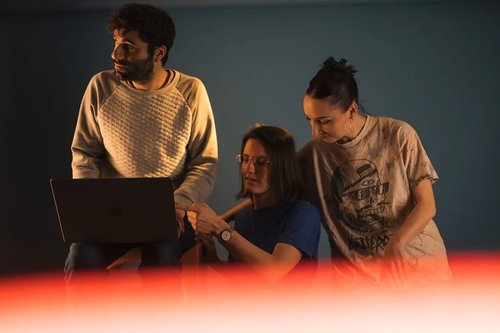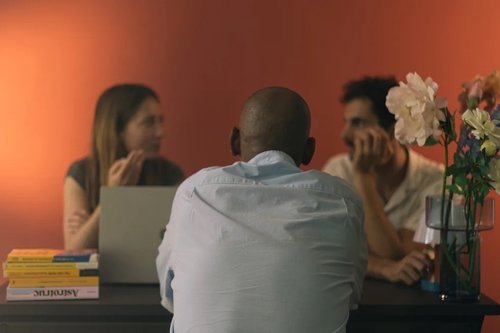Standing out in an interview: Creative responses to common questions
26 nov. 2024
7min


Freelance writer and translator, ex-recruiter
You did it! You crafted the perfect cover letter, spent painstaking hours tweaking and targeting your resume, and sailed through the phone screening to land the interview – Go you! Now it’s time to get serious and put in the prep to ace your interview. Take a look back over your resume and career to date, re-read the job description, and start thinking about what the interviewer wants to hear.
No two interviewers are the same, just as no two candidates are the same, but there are some interview questions like, “What are your strengths and weaknesses” that come up over and over again and probably elicit similar responses from everyone, so add a little pizazz to your game and come up with more creative answers to traditional interview questions. Not sure where to start? Mike Peditto, Director of Talent at Teal, shares his tips for crafting answers that will make you stand out: hint it starts with a little authenticity.
Why do recruiters ask standard questions?
You might wonder why the same kinds of questions seem to come up in interviews regardless of the role or company you’re interviewing for. Partly this might be down to trying to standardize the process and ensure everyone is asked the same thing. It might also be that, in most cases, interviewers want you to be able to answer fully—they’re not trying to catch you out, they want a good, interesting, complete answer. Peditto also believes that it could also be down to a lack of training. “Unfortunately, a lot of interviewers aren’t really trained and they don’t really learn a lot of new stuff and new methods to begin with so they kind of ask what they’ve already known.” This doesn’t give you an excuse to give a standard answer though—you want to stand out from the crowd if you want to land the job!
7 traditional interview questions and how to answer them
What is a creative answer anyway? This is what Peditto has to say on the matter: “When I hear ‘creative answer’, I think what I understand is, it’s not just the standard script everybody says. I think it builds more authenticity. A creative answer is probably a more authentic answer. I think it allows the conversation to feel better.” There’s that word again: authenticity. That’s is all very well and good, but how do you make it work for you? Below you’ll find some tips to help you create more interesting answers to seven traditional interview questions. The theory behind them will work for many other common interview questions too.
1. Tell me about yourself
Peditto says this isn’t really so much about being creative as giving the interviewer the highlights. “A mistake I think people make is trying to talk about everything they’ve ever done and talking for 10 straight minutes rather than letting the interview progress from that.” He recommends using this question to set up the things you want to talk about more, but giving the interviewer the highlights or an overview, which makes them want to dive in and add more. Kind of like an elevator pitch but targeting the role that you’re interviewing for.
2. Why do you want to work here?
Peditto’s tip for this question is to try and demonstrate a level of interest in the company and why it’s a good fit for you. “You have to show you did some work, you have to show there’s some reason you’re a fit. The company wants to know that you have some level of interest.” He suggests ding your researoch and finding out something you really like or something that intrigues you about the company. It could be their community service efforts, a specific software they use, their values, and so on. Then, you can bring that up in the form of a question. Something like, “I saw this job description, and as I was looking into things. I noticed that you recently built this piece of software that I found really interesting, and I would love to be a part of that, but I also would also really love to learn more about this company from you and other people I talk to and hear why it’s so great to work here.” He explains that this shows a true interest in the actual job. It also gets you some information, so you can decide if you really want the job because ultimately they should also be selling their company to you too.
3. Why are you a good fit for the role?
This question would usually come towards the end of the interview, and Peditto says it’s an opportunity to reiterate what you’ve learned and position yourself as the person to solve their problems. Throughout the interview, if you’ve been listening carefully, the recruiter will have likely told you what’s important to them, so Peditto recommends you use this as your chance to remind them of what you bring to the table regarding those things. You could say something like, “You mentioned these two really important things, and as I’ve said I’ve done those two things here and here, and these are the results of them, and that to me feels like the right match of skill set and experience.” Peditto says, “It feels almost more like finalizing a puzzle rather than trying to say anything else. Your answers should be different already than most people’s because it should be about you and what you’ve talked about.”
4. Why are you leaving your current job?
According to Peditto, when asked this question, most candidates respond with something like, “I’m looking for growth opportunities,” which is fine, but it doesn’t really tell the recruiter anything about you. In his opinion, “If you’re able to really specify what it is that’s going to make you happy in a new role and what you’re looking for, that allows the person talking to you to dig into if that stuff exists and really make sure it’s a good fit.”
If, for example, you say, “Because right now, I don’t have a manager who has the time to really work with me and develop me in the area that I want,” and the recruiter knows that in their company it’s going to be the same situation, then actually you’re not a great fit for the role. But if the recruiter knows their manager is great at developing people, then it makes you a perfect candidate. There’s a risk of course, but the risk is landing a job that ultimately isn’t the right job for you. In Peditto’s words, “I feel very confident that this helps with finding the right job, and for some people that might not matter that much.” But for those looking for the right role, he has this advice: “Play to win. You can’t interview with the intention of not being eliminated, you have to interview with the intention of getting the job because that’s often the person who’s getting hired.” It’s not a game of survivor, someone needs to stand out from the crowd.
5. What are your strengths and weaknesses?
The strengths and weaknesses question is a popular favorite among recruiters, but it’s pretty unpopular with candidates. Peditto believes the biggest mistake candidates make on this is just reiterating stock soft skills and buzzwords from the job description—things like, “I’m a team player” or “I’m a great communicator.” The solution? Take those soft skills and explain exactly how they are your strength. For example, “You mentioned that you need someone who works well in a team, here’s an example of how I’ve done that.”
When it comes to weaknesses, Peditto has this advice: “Take something that you know you need to improve that won’t be a detriment to the job—if it’s a sales job don’t say that you hate calling strangers. Explain what you’ve done in the past to try to work on it, and what your plan is for continuing to work on it.” He explains that the interviewer isn’t trying to catch you out here so much as to get an idea of your self-awareness. We all have weaknesses, it’s how we address those that counts.
6. Where do you see yourself in 5 years?
5 years is a really long time. Think back to January 2020 before the pandemic, we never could have predicted all the changes to the world of work that have happened since then. So, trying to predict a five-year plan is kind of wild! So what can you say? Peditto says it’s ok to admit that you’re not sure and to demonstrate your openness and flexibility by saying something like, “What I know is I really like doing this line of work I’m in now. I can see it going a lot of different routes from here, whether it’s management or leadership or just continuing to be an individual contributor. What I’m excited about is to keep as many doors as possible open and to keep learning new skills.” Tailor your thoughts to what you truly think and feel but try to demonstrate a keenness and an open mind.
7. Do you have any questions for me?
Peditto says people often come to him asking what the best questions to ask are, and his answer is actually pretty simple: “Ask about the things that are important to you.” He adds, “I know that can be hard for a lot of people because it means less scripting, but I do a lot of interviews and I hear these same general questions. People will tell you, ‘What does success in this role look like? What is the 30-60-90 plan?’ You probably don’t care and also, a lot of that stuff has been talked about in the interview if you’ve been paying attention.” So listen, pay attention, and ask about what you truly care about. Don’t ask a lithe question about company culture—everyone’s going to say the company culture is great. Instead, Peditto recommends first understanding what culture means to you and then asking about those things. Is it, ‘How are mistakes handled?’ or ‘How do people respond to PTO requests?’ Maybe you want to know about how they’ve developed someone in the role you’re applying for or how they’ve promoted them within the company. Peditto says, “When you ask about things that actually matter to you, it not only helps you learn more about the role, but your questions do make you stand out, and they do make you appear to be someone who is actively trying to find a job that they will be successful in. Companies want to hire somebody who is looking for the right role for them.”
Peditto’s top tip for answering traditional questions is simply, “Taking the time to prepare in advance and really thinking what are my real, authentic answers to these common questions. Balancing of course the fact that there is always some level of authenticity you’re not going to give.” Instead of focusing on ‘What’s the safe answer that I know everyone is looking for?’ focus more on ‘What is my real authentic answer given through a professional lens and tailored to this specific role and company?’ Part of being a good interviewee is being able to figure out what matters most to the company and showing them how you can deliver it.
Key takeaways
The key points to remember when it comes to standard interview questions are:
- Be authentic: Think about what matters to you.
- Be specific: The question might be generic but you need to tailor your answers to that specific company and role, every interview will be different.
- Pay attention: Listen and work out what is important to the company so you can demonstrate how you can help.
- Don’t play it safe: Interview to win, not to avoid being eliminated.
Photo: Welcome to the Jungle
Follow Welcome to the Jungle on Facebook, LinkedIn, and Instagram and subscribe to our newsletter to get our latest articles every week!

Inspirez-vous davantage sur : Réussir son entretien

Why are you leaving your job? Here's how to nail the answer
Caught off guard by 'Why are you leaving your job?' Here's how to flip this tricky question into a spotlight on your goals and potential.
24 déc. 2024

The Pratfall Effect: Can screwing up in a job interview make you more likable?
Mistakes you make in a job interview could actually work to your advantage ...
14 oct. 2024

How to bring up your long-term career goals in an interview
Be honest but strategic. The key is aligning your goals with the role while showing flexibility and ambition. Avoid faking it!
24 sept. 2024

Is honesty the key to discussing your weaknesses?
Are your weaknesses holding you back in an interview? A bit of honesty can flip the script and make your flaws work in your favor.
21 août 2024

The DEI-decoder: Assessing values during an interview
DEI is a crucial part of company culture. So, how can you evaluate it during the recruitment process?
02 juil. 2024
La newsletter qui fait le taf
Envie de ne louper aucun de nos articles ? Une fois par semaine, des histoires, des jobs et des conseils dans votre boite mail.

Vous êtes à la recherche d’une nouvelle opportunité ?
Plus de 200 000 candidats ont trouvé un emploi sur Welcome to the Jungle.
Explorer les jobs